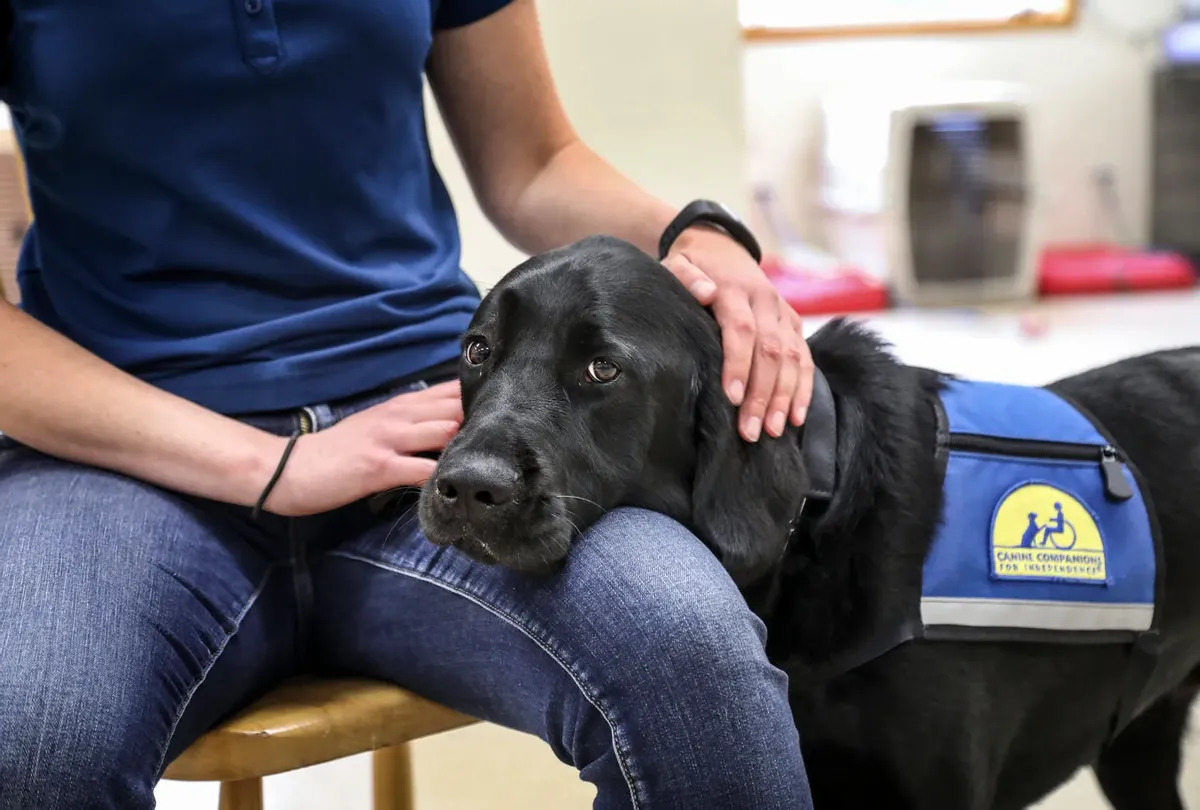Home>Health & Wellness>Common Health Issues>Muscular and Joint Health>What Would A Service Dog Do For Arthritis?


Muscular and Joint Health
What Would A Service Dog Do For Arthritis?
Published: February 9, 2024
Discover how service dogs can support muscular and joint health for arthritis sufferers. Learn about the benefits of service dogs for managing arthritis.
(Many of the links in this article redirect to a specific reviewed product. Your purchase of these products through affiliate links helps to generate commission for Pawsomeoldies.com, at no extra cost. Learn more)
Table of Contents
Introduction
Arthritis is a common condition that affects millions of people worldwide, causing pain, stiffness, and reduced mobility. It can significantly impact a person's quality of life, making everyday tasks challenging and sometimes impossible. While there are various treatment options available, including medication, physical therapy, and lifestyle modifications, the support and companionship of a service dog can make a remarkable difference in managing arthritis symptoms.
In this article, we will explore the invaluable role that service dogs play in assisting individuals with arthritis. These remarkable animals are trained to provide physical and emotional support, helping their owners navigate the challenges posed by arthritis with greater ease and confidence. By understanding the ways in which service dogs can alleviate arthritis symptoms and enhance the overall well-being of their owners, we can gain insight into the profound impact of these loyal companions.
Read more: What Does A Service Dog Do For Anxiety?
Understanding Arthritis
Arthritis is a prevalent condition that encompasses a diverse range of joint disorders, affecting people of all ages, genders, and backgrounds. It is characterized by inflammation, pain, and stiffness in the joints, which can significantly impair mobility and diminish the overall quality of life. The most common types of arthritis include osteoarthritis, rheumatoid arthritis, and juvenile arthritis, each with its unique causes and manifestations.
Osteoarthritis, the most widespread form of arthritis, occurs when the protective cartilage that cushions the ends of the bones wears down over time. This can lead to pain, swelling, and difficulty in performing daily activities, such as walking, climbing stairs, or grasping objects. Rheumatoid arthritis, on the other hand, is an autoimmune disorder in which the body's immune system mistakenly attacks the joints, resulting in inflammation and joint damage. Juvenile arthritis refers to arthritis that occurs in individuals under the age of 16, presenting symptoms similar to those in adults.
The impact of arthritis extends beyond physical discomfort, often causing emotional distress and mental fatigue. Individuals with arthritis may experience frustration, anxiety, and depression due to the limitations imposed by the condition. Simple tasks that were once taken for granted, such as opening a jar or tying shoelaces, can become arduous challenges, leading to a sense of helplessness and isolation.
Furthermore, arthritis can affect various parts of the body, including the hands, knees, hips, and spine, making it a multifaceted and complex condition. Its unpredictable nature and fluctuating symptoms necessitate a comprehensive approach to management, involving medical intervention, lifestyle adjustments, and emotional support.
By gaining a deeper understanding of the complexities of arthritis, we can appreciate the significance of effective management strategies, including the invaluable assistance provided by service dogs. These remarkable animals offer not only physical aid but also emotional comfort, playing a vital role in enhancing the well-being of individuals living with arthritis.
The Role of Service Dogs in Arthritis Management
Service dogs play a pivotal role in arthritis management, offering a unique blend of physical assistance and emotional support to individuals grappling with the challenges posed by this debilitating condition. These highly trained canines are adept at providing practical aid, such as retrieving items, opening doors, and assisting with balance, thereby alleviating the physical strain associated with arthritis. Moreover, their unwavering companionship and intuitive understanding of their owner's needs contribute significantly to the emotional well-being of individuals living with arthritis.
One of the primary functions of service dogs in arthritis management is their ability to assist with mobility. For individuals with arthritis, tasks that involve bending, reaching, or lifting can be arduous and painful. Service dogs are trained to retrieve dropped items, carry objects, and provide support while walking, thereby reducing the physical exertion and discomfort experienced by their owners. By performing these tasks, service dogs help individuals conserve their energy and minimize joint strain, enabling them to navigate their daily routines with greater ease and independence.
In addition to physical assistance, service dogs offer invaluable emotional support to individuals coping with arthritis. The presence of a loyal and empathetic companion can significantly alleviate feelings of loneliness, anxiety, and depression commonly associated with chronic conditions. Service dogs provide unwavering companionship, offering a source of comfort and reassurance to their owners. Their intuitive ability to sense changes in their owner's mood and physical condition enables them to provide timely emotional support, fostering a sense of security and well-being.
Furthermore, service dogs can help individuals with arthritis to maintain a more active and fulfilling lifestyle. By providing motivation and encouragement, these remarkable animals can inspire their owners to engage in physical activities and social interactions, which are essential for combating the physical and emotional effects of arthritis. Whether it's accompanying their owners on walks, participating in therapeutic exercises, or simply being a constant source of joy and companionship, service dogs play a vital role in promoting a positive and active lifestyle for individuals living with arthritis.
In essence, the role of service dogs in arthritis management extends far beyond mere assistance; it encompasses a profound and multifaceted contribution to the overall well-being of their owners. Through their unwavering support, practical aid, and empathetic companionship, service dogs serve as invaluable allies in empowering individuals to lead fulfilling and independent lives despite the challenges posed by arthritis.
How Service Dogs Can Help with Arthritis Symptoms
Service dogs play a crucial role in alleviating the symptoms of arthritis and enhancing the overall quality of life for individuals grappling with this challenging condition. These remarkable animals offer multifaceted support, addressing both the physical limitations and emotional distress associated with arthritis.
Physical Assistance
Service dogs are trained to perform a myriad of tasks that directly mitigate the physical challenges posed by arthritis. One of the most significant ways in which they assist is by retrieving items. For individuals with arthritis, bending down to pick up dropped objects can be excruciating and strenuous. Service dogs are adept at retrieving items such as keys, phones, or even medication, thereby sparing their owners from the discomfort and potential joint strain associated with such movements.
Moreover, service dogs can provide invaluable support with balance and stability. Arthritis can compromise an individual's ability to maintain steady footing, especially when navigating uneven terrain or stairs. Service dogs are trained to offer stability and assistance while walking, helping their owners to maintain balance and reduce the risk of falls. This not only enhances safety but also instills a sense of confidence and independence in individuals with arthritis.
Read more: Dog With Allergies – What Shampoo Would Help
Emotional Comfort and Support
In addition to their practical aid, service dogs offer unparalleled emotional comfort and support. Living with arthritis can be emotionally taxing, often leading to feelings of isolation, anxiety, and depression. Service dogs provide unwavering companionship, offering a source of solace and reassurance to their owners. Their intuitive ability to sense changes in mood and physical condition enables them to provide timely emotional support, fostering a sense of security and well-being.
Encouraging Physical Activity
Service dogs play a pivotal role in encouraging individuals with arthritis to engage in physical activity. Regular exercise is crucial for managing arthritis symptoms, as it helps to maintain joint flexibility and strength. Service dogs can motivate their owners to engage in activities such as walking, stretching, or even playing, thereby promoting a more active and fulfilling lifestyle. By fostering a sense of joy and companionship, service dogs inspire individuals with arthritis to embrace physical activities that are essential for mitigating the effects of the condition.
In summary, the support provided by service dogs in alleviating arthritis symptoms is multifaceted, encompassing physical assistance, emotional comfort, and encouragement for an active lifestyle. Their unwavering dedication and intuitive understanding of their owner's needs make them invaluable allies in the management of arthritis, significantly enhancing the well-being and independence of individuals living with this challenging condition.
Training and Certification for Service Dogs
The training and certification process for service dogs is a rigorous and comprehensive endeavor that equips these remarkable animals with the skills and aptitude to provide invaluable support to individuals with arthritis and other disabilities. The journey to becoming a certified service dog involves specialized training, stringent assessments, and adherence to established standards, ensuring that these canines are proficient in meeting the diverse needs of their owners.
Specialized Training
Service dogs undergo specialized training tailored to the specific requirements of individuals with arthritis. This training encompasses a wide array of skills, including retrieving items, providing stability and balance assistance, and offering emotional support. For individuals with arthritis, these skills are instrumental in mitigating the physical challenges and emotional distress associated with the condition. Service dogs are trained to respond to various commands and cues, enabling them to perform tasks such as retrieving dropped objects, opening doors, and providing physical support while walking. Moreover, they are taught to exhibit calm and composed behavior in diverse environments, ensuring that they can accompany their owners seamlessly in various settings.
Read more: How Do Service Dogs Help With Allergies
Stringent Assessments
Upon completion of their training, service dogs undergo stringent assessments to evaluate their proficiency and suitability for assisting individuals with arthritis. These assessments encompass a range of scenarios and tasks, designed to assess the dog's ability to perform essential functions reliably and effectively. The dogs are evaluated on their responsiveness to commands, their demeanor in public spaces, and their capacity to provide physical and emotional support to their owners. These assessments are crucial in ensuring that service dogs are well-prepared to meet the unique needs of individuals with arthritis and provide consistent, reliable assistance in diverse situations.
Adherence to Standards
Certification for service dogs involves adherence to established standards set forth by reputable organizations and training facilities. These standards encompass the training curriculum, assessment criteria, and ethical guidelines for the treatment and care of service dogs. By adhering to these standards, service dogs and their trainers uphold the integrity and reliability of the service dog industry, ensuring that individuals with arthritis receive the highest quality of support and companionship. Moreover, adherence to standards instills confidence in the public regarding the capabilities and professionalism of service dogs, fostering a positive and inclusive environment for individuals with disabilities.
In essence, the training and certification process for service dogs is a meticulous and purposeful journey that culminates in the development of highly skilled and empathetic companions for individuals with arthritis. Through specialized training, stringent assessments, and adherence to established standards, service dogs are equipped to provide unwavering support, physical assistance, and emotional comfort to individuals navigating the challenges of arthritis.
Considerations for Getting a Service Dog for Arthritis
When considering the prospect of getting a service dog to assist with arthritis, several important factors warrant careful consideration. The decision to welcome a service dog into one's life is a significant and transformative step, and it is essential to evaluate various aspects to ensure that the partnership between the individual and the service dog is harmonious and beneficial.
Understanding Personal Needs
Before embarking on the journey of acquiring a service dog for arthritis, it is crucial to assess one's specific needs and challenges. Each individual's experience with arthritis is unique, and understanding the particular limitations and requirements is fundamental in determining how a service dog can provide meaningful assistance. Whether it involves physical tasks such as retrieving items or emotional support to alleviate anxiety and loneliness, a clear understanding of one's needs forms the cornerstone of a successful partnership with a service dog.
Read more: What To Do For Dog’s Hip Arthritis
Commitment to Care and Training
Introducing a service dog into one's life necessitates a steadfast commitment to the care and training of the canine companion. Service dogs require consistent care, including regular exercise, grooming, and veterinary attention to ensure their well-being and readiness to fulfill their duties effectively. Additionally, ongoing training and reinforcement of commands are essential to maintain the dog's proficiency in assisting with arthritis-related tasks and providing emotional support. The dedication to nurturing a strong and mutually beneficial bond with the service dog is integral to the success of the partnership.
Lifestyle and Living Arrangements
The individual's lifestyle and living arrangements play a pivotal role in determining the suitability of integrating a service dog into their daily routine. Factors such as the availability of space for the dog, the individual's mobility within their living environment, and the presence of any other pets or family members should be carefully evaluated. It is essential to create a conducive and supportive environment that accommodates the needs of both the individual and the service dog, fostering a harmonious and enriching coexistence.
Financial Considerations
The financial responsibilities associated with caring for a service dog should be thoroughly considered. These responsibilities encompass expenses related to the dog's food, grooming, veterinary care, and potential unforeseen medical needs. Additionally, the costs associated with training and certification, as well as any specialized equipment or accommodations required to facilitate the dog's assistance, should be factored into the financial considerations. Ensuring the ability to meet these financial obligations is essential in providing the service dog with the care and support it requires to fulfill its role effectively.
Emotional Preparedness
Embracing the presence of a service dog entails emotional preparedness to welcome a loyal and dedicated companion into one's life. The bond between an individual and their service dog transcends mere assistance; it embodies a profound connection built on trust, empathy, and mutual support. Being emotionally prepared to embrace the responsibilities and joys of caring for a service dog is pivotal in fostering a nurturing and enduring partnership.
In essence, the decision to acquire a service dog for arthritis necessitates a comprehensive evaluation of personal needs, commitment to care and training, suitability of living arrangements, financial considerations, and emotional preparedness. By conscientiously considering these factors, individuals can embark on a transformative journey that holds the potential to significantly enhance their quality of life and well-being in the company of a devoted and capable service dog.
Conclusion
In conclusion, the invaluable role of service dogs in assisting individuals with arthritis is profound and multifaceted. These remarkable animals offer a unique blend of physical assistance, emotional support, and unwavering companionship, significantly enhancing the overall well-being and independence of individuals grappling with the challenges posed by arthritis. Through their specialized training, intuitive understanding of their owner's needs, and steadfast dedication, service dogs emerge as indispensable allies in the management of arthritis, offering practical aid and emotional comfort in equal measure.
The physical assistance provided by service dogs, including retrieving items, offering stability and balance support, and facilitating engagement in physical activities, directly mitigates the challenges posed by arthritis, enabling individuals to navigate their daily routines with greater ease and confidence. Moreover, the emotional support and companionship offered by service dogs play a pivotal role in alleviating feelings of loneliness, anxiety, and depression commonly associated with arthritis, fostering a sense of security and well-being for their owners.
The decision to acquire a service dog for arthritis warrants careful consideration of personal needs, commitment to care and training, suitability of living arrangements, financial considerations, and emotional preparedness. By conscientiously evaluating these factors, individuals can embark on a transformative journey that holds the potential to significantly enhance their quality of life in the company of a devoted and capable service dog.
In essence, the partnership between individuals with arthritis and service dogs embodies a harmonious synergy, where the unwavering dedication and empathetic understanding of these remarkable animals converge with the resilience and spirit of their owners. Together, they navigate the challenges posed by arthritis with fortitude and grace, embodying the profound impact of the human-canine bond in overcoming adversity and embracing life to the fullest.
The presence of a service dog transcends mere assistance; it symbolizes a profound connection built on trust, empathy, and mutual support, offering a beacon of hope and resilience in the face of adversity. As we continue to recognize and celebrate the remarkable contributions of service dogs in enhancing the lives of individuals with arthritis, we affirm the enduring bond between humans and their loyal canine companions, a bond that exemplifies the transformative power of empathy, understanding, and unwavering companionship.











